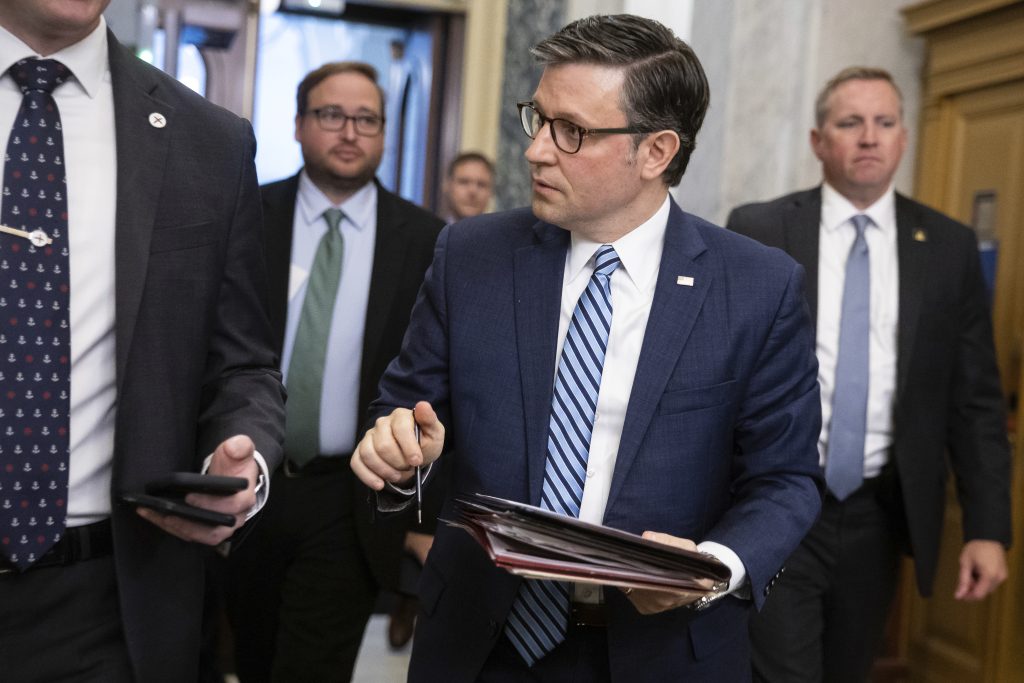House Republicans landed a big political punch against President Joe Biden on Wednesday, just hours before they’re set to welcome Donald Trump to the Hill. They almost certainly can’t do more before November.
Speaker Mike Johnson on Wednesday kept his fractured conference in line long enough to hold Attorney General Merrick Garland in contempt for defying GOP demands for audio of Biden’s interview with former special counsel Robert Hur. It was a move long sought by Trump and his many Hill allies — yet it’ll be a short-lived victory for Johnson’s House GOP.
Republicans are now staring down a grueling five-week slog that will test Johnson’s ability to manage his unruly factions, not to mention Trump’s outsized expectations. The GOP still has to push through scores of divisive amendments that Republicans had to greenlight in order to satisfy their right flank or risk derailing debate on the annual defense policy bill, which was once a bipartisan affair. And Trump boosters want to go much further than the Garland contempt finding, including trying to defund the former president’s prosecutors.
GOP leaders’ thin margin of control in the House, however, means they’re unlikely to hit Biden’s Department of Justice in any major way during the current government funding debate. Conservatives who believe the White House is within their reach want to pack their pro-Trump priorities into this summer’s lineup of spending bills — such as yanking money from DOJ special counsel Jack Smith or blocking new funding for an FBI headquarters.
But even some of the House GOP’s staunchest pro-Trump hardliners are openly acknowledging that in order to further rein in the DOJ, their colleagues would have to be willing to shut down the government over it. And that support among Republicans simply isn’t there. It’s not even clear they’ll be able to get an initial DOJ funding bill through the House after it ran aground due to GOP divisions last year.
“As a practical matter, I think it’s over,” Rep. Dan Bishop (R-N.C.) said about the chance of blocking money for a new FBI headquarters. “To me, you need a new batch of Republicans who are willing to actually do something. … I haven’t seen a hotbed of Republicans ready to fight for significant change.”
Instead, most Republicans acknowledge it’s time to turn ahead to a potential agenda for 2025 if they can win full control of Washington this fall. Johnson has already begun coordinating with Senate Republicans, crossing the Capitol earlier Wednesday to discuss goals such as another round of GOP tax cuts. The speaker also told reporters he expects preparation for next year to be on the agenda for Trump’s Thursday visit.
“We’ve got to have a very aggressive first 100 days agenda” in the event of a GOP takeover in November, Johnson said. “So in light of that we are having discussions with [him] and his team and amongst ourselves to plan accordingly.”
Even this fall’s looming spending fight will focus on who controls the White House in 2025. Bishop described his biggest priority for funding season as “helping President Trump in his second term,” which means avoiding a mammoth end-of-year bill that would jam the presumptive GOP nominee by locking in funding until October 2025.
Rep. Ralph Norman (R-S.C.), another member of the conservative Freedom Caucus, added that he “wanted everything punted until the new Congress, and the new president hopefully comes in.” That demand is already getting private pushback from Republicans who are responsible for crafting the government funding bills, as well as some members of leadership.
As for the rest of the right flank’s wish list, GOP leaders will continue to have a difficult time getting anything passed. For instance, Johnson is getting an earful from moderates who are uneasy with their party’s growing willingness to use its small majority to try to target the DOJ or Trump’s prosecutors.
During a closed-door meeting on Tuesday night, South Carolina Rep. Russell Fry walked fellow Republicans through a pro-Trump bill that would let a former president move state charges to federal court — a plan that leadership had hoped to bring to the floor as soon as Thursday, timed to their meeting with Trump.
Party leaders, including staunch Trump ally and House Judiciary Chair Jim Jordan (R-Ohio), touted the bill again during Wednesday’s closed-door conference meeting.
“We need to pass it. We passed it out of committee a year ago,” Jordan said, adding that GOP leadership has begun whipping support for the bill.
But Fry’s bill is drawing skepticism from multiple corners of the conference. POLITICO reported late last week that moderate and centrist members were reaching out to leadership to air their opposition. And Fry got tough questions from Republicans during their closed-door meeting on Tuesday, according to one attendee.
Republicans from the conference’s governing wing are worried about making a sweeping change to the American justice system simply because they are fired up after Trump’s conviction on 34 felony counts in New York. Asked about the bill, Rep. David Joyce (R-Ohio) said in a brief interview that the U.S. legal structure has been in place for centuries, and “for us to mess with it just because we don’t like one set of circumstances doesn’t make a whole lot of sense.”
It’s not just moderates. One rank-and-file conservative member, granted anonymity to speak candidly, told POLITICO that they had reached out to Johnson for a meeting to raise concerns about the legislation.
The conservative member described themselves as “one of” the Republicans who have issues with the bill, saying it’s unclear “how it comes to pass” the House at all.
Even if GOP leaders can’t do much on the floor, they can — and will — still make Trump a focus of their committee work. The House Judiciary Committee will hold a hearing Thursday, the same day of Trump’s visit to the Hill, focused on the Manhattan district attorney’s “unprecedented politicized indictment” of the former president.
Jordan put it this way: “We’re having experts come in and talk about how ridiculous the trial was.”




